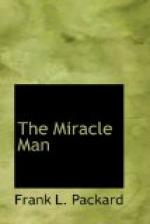He had done his work well! In the first few moments, an hour ago, when he had begun to consider the problem, as seeming difficulties arose, he had turned coolly from one alternative to another. And then slowly a sickening sense of the truth had begun to dawn upon him—and like a man lost in a great forest, peril around him, he had plunged then desperately in this direction and in that, as a glimmering point of light here or there had seemed to promise an avenue of escape—only to find it vanish at almost the first step, the way closed as by some invisible, remorseless power. No, not invisible—it seemed to take the form of the Patriarch—for at every turn the majestic figure stood and would not let him pass.
Madison’s face was gray now as he walked up and down the room—there was his own revulsion, his abhorrence at the part he had played, a frantic, honorable eagerness to be rid of it; there were these others too who looked to him, the Flopper and Pale Face Harry; and there was—Helena! He did not dare to look at the misery in her face again—he was unmanned enough now.
And then Helena spoke.
“It—it seems,” she said, in a low broken way, “as if—as if God did not want to pardon us—as if our repentance had come too late, and that there was no Eleventh Hour for us.” Then, in passionate pleading, facing Madison: “God cannot mean that—it is we who cannot see. There is some way out—there must be—there must be.”
“It begins and ends with the Patriarch,” said Madison monotonously. “We can’t sacrifice him—can we! What’s the use of going over it again? It all comes back to the same point—the Patriarch.”
“Yes, yes; I know, I know,” she said piteously. “But think, Doc—think! See now, we just send back all the money and jewels—we know to whom they belong.”
“Well, what reason do we give?” Madison said heavily. “The Patriarch is alive and well. The immediate corollary is that from the moment we do that, to-morrow morning for instance, every gift, every offering here is suddenly refused. What reason do we give? If it were only the donors who were to be considered it might be done. It’s human nature that ninety-nine out of every hundred of them”—his voice rose a little bitterly—“would probably be only too glad to get their money back—and the mere statement that you, as the Patriarch’s grand-niece, his only relative, on mature thought did not consider the project as planned advisable might suffice. But this thing goes beyond that, beyond even the remaining few who are earnestly interested and would cause us trouble—it is world-wide in its publicity! Every newspaper in the land would snatch at it for a headline, and ask—why? And they would not be content with simply asking why—this thing is too big for that—too much before the people’s eyes—too good ‘copy.’ They’d start in to find out—and the result is inevitable. Our safety so far has lain




